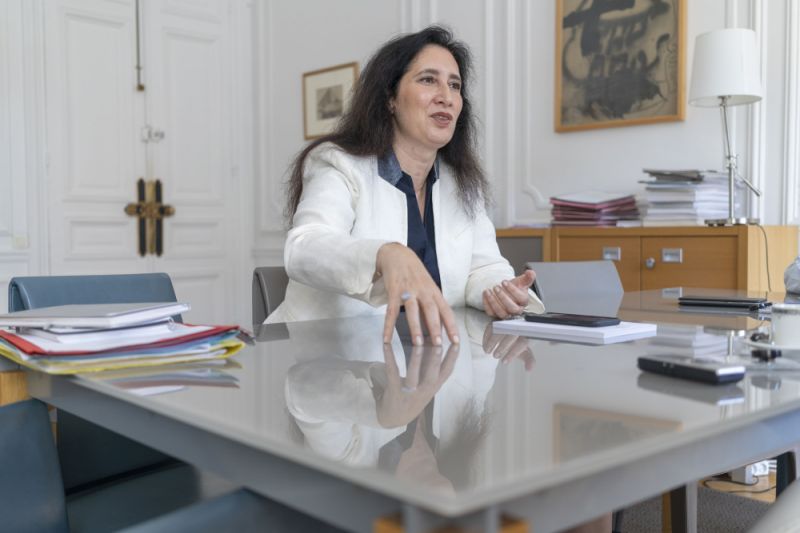(Bloomberg) — France’s Isabelle de Silva may be about to become Europe’s most feared antitrust regulator as Margrethe Vestager’s term as European Union competition commissioner winds down.
De Silva, 49, was picked to head France’s antitrust arm in 2016 and immediately grabbed headlines fining firms owned by billionaire Patrick Drahi. Since then her achievements have been somewhat overshadowed by those of her EU counterpart who doled out massive penalties to the likes of Google.
That may be changing as the EU readjusts amid a top jobs reshuffle in the coming weeks and as de Silva enters a more assertive phase of her five-year term as president of the Autorite de la Concurrence.
In an interview at her Paris office last month, de Silva said she’s set her sights on Apple Inc. and Facebook Inc.’s forays into online payments. She’s also wary of the power Amazon.com Inc. and Alphabet Inc.’s Google could gain via their digital assistants.
But she also said that merger watchdogs need more power to vet so-called killer acquisitions, where big companies snap up fledgling firms and their ideas.
“There can be major competition concerns the instant new actors gain strong positions in the payment sector while also having strongholds elsewhere,” de Silva said, referring to products such as Apple Pay. “It could amount to existing dominant market power being strongly enhanced.”
She’s made the issue a priority for the next year and a half and is weighing a study focusing on fintech and payment systems.
Born in New York and a graduate of France’s Ecole Nationale d’Administration, de Silva spent several years working at the country’s top administrative court and for various ministries before getting a break as antitrust chief. Her soft style contrasts with Vestager’s panache and while the Dane was levying record fines or ordering Apple to repay billions of euros in back taxes at the EU’s executive arm, de Silva’s two largest penalty decisions amount to less than half a billion euros.
Possible Fines
Still, she has several investigations on the go. Recent antitrust complaints issued to pharma giants Novartis AG and Roche Holding AG suggest possible upcoming fines.
De Silva also says her team is planning to conclude this year or early next year “very active” investigations into online advertising, which could also have a potential impact on Silicon Valley tech giants.
“Online advertising is crucial for us since it’s about the use of data, because all the value is based on user data,” she said. “It’s a duopoly” with Google and Facebook grabbing 80-90% market share in some sectors. Their power requires they “pay attention to the way they treat business partners and the ecosystem around them.”
Europe’s national regulators often move faster than the EU against big tech; with France prone to ordering behavior changes before the end of a probe via interim measures as it did earlier this year when it told Google to clarify some ads rules.
Big Question
Amazon’s Echo, animated by the voice assistant Alexa, and Google’s Home, with its Assistant, are also developments where de Silva says competition regulators need to be vigilant — even though there are no immediate concerns.
“There’s one big question: will it become the entry point for purchases?” she wonders.
Officials at the tech companies all declined to comment.
On M&A enforcement, de Silva warns that, despite spectacular growth, many coveted startups in the tech, health and media industry don’t have high enough sales to trigger antitrust scrutiny when bigger companies seek to buy them.
Her 18-strong merger-control team has been putting together a list of cases that could be of interest if lawmakers extend their powers to enable them to have a say over possible killer acquisitions. “What remains to be seen is whether the legislative framework will be put in place at a European or national level,” she said in the Paris interview.
In the past two years, the Autorite de la Concurrence powerlessly watched two French unicorns — car-sharing app Blablacar and doctor-appointment booking app Doctolib — acquire rivals and Boiron SA, the world’s leading homeopathy firm, buy Laboratoire Ferrier. There may have been no competition concerns but that’s beside the point, according to de Silva: regulators were simply unable to check.
She also cited Facebook’s $1 billion purchase of Instagram seven years ago as food for thought, pointing to the need for antitrust regulators to take into account potential competition as well when assessing mergers.
“It’s a concrete example where a company could have risen to Facebook’s level or at least created a rival social network,” de Silva said.
“Was it a mistake to authorize that Instagram transaction? These are complex topics because there are those who say that Instagram wouldn’t be where it is now if Facebook hadn’t made investments.”
Still, she concedes that the situation isn’t clear cut as many startups’ founders are keener to exit in billion-dollar deals rather than trying to take on the likes of Facebook or Google.
To contact the reporters on this story: Gaspard Sebag in Paris at [email protected];Aoife White in Brussels at [email protected]
To contact the editor responsible for this story: Anthony Aarons at [email protected]
<p class="canvas-atom canvas-text Mb(1.0em) Mb(0)–sm Mt(0.8em)–sm" type="text" content="For more articles like this, please visit us at bloomberg.com” data-reactid=”70″>For more articles like this, please visit us at bloomberg.com
©2019 Bloomberg L.P.














